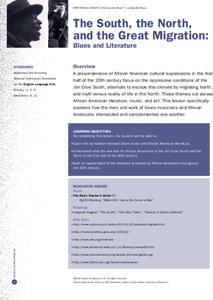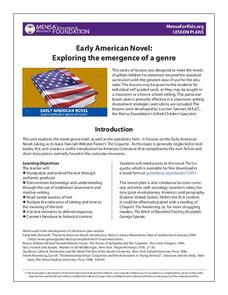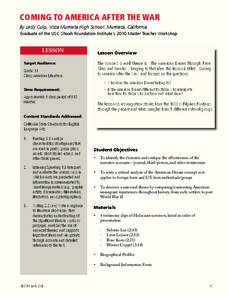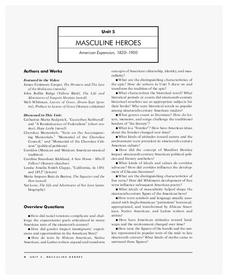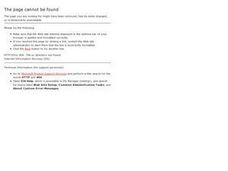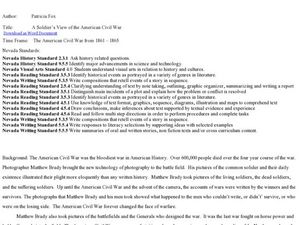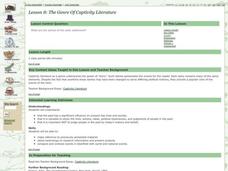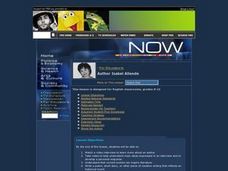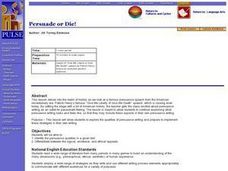Curated OER
The South, the North and the Great Migration: Blues and Literature
Here is a complex lesson plan that interweaves the history of the Jim Crow South and the Great Migration with the study of poetry, art, and blues music from the Harlem Renaissance. The plan helps young historians develop a deep...
National Endowment for the Humanities
Literary Genres in “Moby-Dick”
Moby Dick is more than a whale of a tale narrated by Ishmael. A lesson studying Herman Melville's classic novel asks readers to examine the different genres the author weaves into his story. Instructors model how to conduct a stylistic...
Curated OER
Lesson 1: Faulkner's The Sound and the Fury
I love Faulkner, his experimental style and stream of consciousness are so exciting. Your learners can analyze William Faulkner and his novel, The Sound and the Fury by defining his place in American literary history and exploring his...
MENSA Education & Research Foundation
Early American Novel: Exploring the Emergence of a Genre
Need an extra challenge for your best readers? Check out a unit that uses Hannah Webster Foster’s epistolary novel, The Coquette, published in 1797, as the anchor text. The resource is packed with project ideas; each with its own...
Curated OER
Exploring Race Through Literature
Provide your class with an opportunity to examine race through a variety of literary works. They read and analyze a chosen poem, interview, speech, or story describing race in America. They then use key words from the original work to...
Santa Ana Unified School District
Early American Poets
The poems of Walt Whitman and Emily Dickinson are the focus of a unit that asks readers to consider how an artist's life and changes in society influences his or her work. After careful study of Whitman's and Dickinson's perspectives on...
National Endowment for the Humanities
In Emily Dickinson's Own Words: Letters and Poems
Analyze the depth and beauty of American Literature by reading Emily Dickinson's letters and poems. The class analyzes Dickinson's poetic style and discusses Thomas Wentworth Higginson's editorial relationship with Dickinson. They pay...
University of Southern California
Coming to America After the War
As part of their exploration of the American dream, class members examine primary source materials to compare immigrant experiences of those arriving early in our country's history to those arriving in the US after World War II. To...
Annenberg Foundation
Social Realism
Many American writers in the late nineteenth century wanted their writing to reflect real life. Individuals watch and discuss a video, read and explore author biographies, write a journal entry and a poem, and complete a multimedia...
Annenberg Foundation
Slavery and Freedom
How do nineteenth-century texts by African American and Native American writers contribute to the country's ideals of freedom and individuality? Learners explore the topic by watching and discussing a video, reading biographies, writing...
Annenberg Foundation
Masculine Heroes
What were the driving forces behind American expansion in the nineteenth century, and what were its effects? Scholars watch a video, read biographies, engage in discussion, write journals and poetry, draw, and create a multimedia...
National Endowment for the Humanities
Tales of the Supernatural
Scary stuff! Whether approached as the first horror story or a "serious imaginative exploration of the human condition," Frankenstein continues to engage readers. Here's a packet of activities that uses Mary Shelley's gothic novel to...
Curated OER
William Apess and the Mashpee "Revolt" of 1833
Prompt your class with the following question: What was the status of American Indians in Massachusetts during Jackson's presidency? To answer this question, class members will read a series of primary source documents (attached),...
Curated OER
A Soldier's View of the American Civil War
Study and research the American Civil War in this explanatory writing activity. Middle schoolers complete six activities to learn about the American Civil War and soldiers' views of the war. The activity includes several options to...
Penguin Books
A Teacher’s Guide to the Signet Classics Edition of Mary Shelley ’s Frankenstein
Contrary to popular belief, the monster's name in Mary Shelley's Frankenstein is not Frankenstein. A teacher's guide for the novel helps readers make sense of key details in the text, define vocabulary words, and discuss prominent...
ReadWriteThink
Designing Museum Exhibits for The Grapes of Wrath: A Multigenre Project
Challenge readers of John Steinbeck's The Grapes of Wrath to create a museum exhibit that uses artifacts to focus on one issue raised by the award winning story of the Great Depression, the Dust Bowl, and the Joads.
Curated OER
The Genre of Captivity Literature
Students make reference to previously presented material,
National Endowment for the Humanities
Narrative Voice in Moby Dick
Call him a reliable narrator! Ishmael is the focus of a lesson that asks readers to analyze the complex character of Herman Melville's narrator as he is introduced in the first chapter of Moby Dick.
Curated OER
Literature: Isabel Allende
Students watch and respond to a Bill Moyers Now video on the Chilean author, Isabel Allende. They brainstorm a list of recent events that might inspire writers and choose one to write about in poetic, diary, or short story form.
Japan Society
Changing Times, Changing Styles: New Japanese Literary Styles of the Late Nineteenth Century
Focusing on Doppo's "Unforgettable People" and late nineteenth century Japanese literature, this resource also leads to discussions of form being dictated by content. Explore the development of new literary styles first-hand by...
Curated OER
Crane, London, and Literary Naturalism
Young scholars read London's "To Build a Fire" and Crane's "The Open Boat" and compare and contrast the authors' style as they explore the genre known as American literary naturalism.
Curated OER
Persuade or Die!
Students read Patrick Henry's speech. They review prior learning about persuasive writing, and the American revolutionary war. Students listen as the teacher reads Patrick Henry's speech aloud to the class using lots of emotion and...
Curated OER
Crane, London, and Literary Naturalism
Students identify the key characteristics that comprise American literary naturalism in Jack London's "To Build a Fire" and Stephen Crane's "The Open Boat." In this naturalism analysis instructional activity, students identify...
Curated OER
African-American History and Culture in the English Classroom
Ninth graders identify and recognize characteristics of nonfiction in literary works, explore language and culture of Gullah people, compare and contrast purposes of spirituals and quilts in terms of their relationships to escape from...


